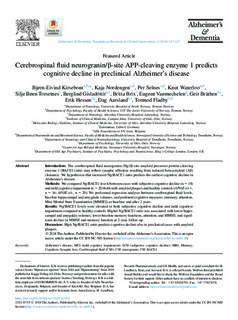Cerebrospinal fluid neurogranin/β-site APP-cleaving enzyme 1 predicts cognitive decline in preclinical Alzheimer's disease
Kirsebom, Bjørn-Eivind; Nordengen, Kaja; Selnes, Per; Waterloo, Knut; Torsetnes, Silje Bøen; Gisladottir, Berglind; Brix, Britta; Eugeen, Vanmechelen; Bråthen, Geir; Hessen, Erik; Aarsland, Dag; Fladby, Tormod
Journal article, Peer reviewed
Published version

View/
Date
2018Metadata
Show full item recordCollections
Original version
Alzheimer's and Dementia: Translational Research and Clinical Interventions. 2018, 4 617-627. 10.1016/j.trci.2018.10.003Abstract
Introduction
The cerebrospinal fluid neurogranin (Ng)/β-site amyloid precursor protein-cleaving enzyme 1 (BACE1) ratio may reflect synaptic affection resulting from reduced beta-amyloid (Aβ) clearance. We hypothesize that increased Ng/BACE1 ratio predicts the earliest cognitive decline in Alzheimer's disease.
Methods
We compared Ng/BACE1 levels between cases with subjective cognitive decline (n = 18) and mild cognitive impairment (n = 20) both with amyloid plaques and healthy controls (APOE-ε4+, n = 16; APOE-ε4-, n = 20). We performed regression analyses between cerebrospinal fluid levels, baseline hippocampal and amygdala volumes, and pertinent cognitive measures (memory, attention, Mini Mental State Examination [MMSE]) at baseline and after 2 years.
Results
Ng/BACE1 levels were elevated in both subjective cognitive decline and mild cognitive impairment compared to healthy controls. Higher Ng/BACE1 ratio was associated with lower hippocampal and amygdala volumes; lower baseline memory functions, attention, and MMSE; and significant decline in MMSE and memory function at 2-year follow-up.
Discussion
High Ng/BACE1 ratio predicts cognitive decline also in preclinical cases with amyloid plaques.
